Lysosomal degradation and chromosomal stability
Authors
Eugènia Almacellas, Joffrey Pelletier, Charles Day, Santiago Ambrosio, Albert Tauler, Caroline Mauvezin. Contacts: Dr. Albert Tauler, tauler@ub.edu and Dr. Caroline Mauvezin caroline.mauvezin@gmail.com
Link to the original articleYear of publication
2020
Journal
Autophagy
Abstract
A team from the Cancer Metabolism Laboratory led by Dr. Albert Tauler, Principal Investigator of the Bellvitge Biomedical Research Institute (IDIBELL) and Professor at the University of Barcelona (UB) have described that lysosomes and autophagy processes are active during mitosis and are necessary for a correct cell division. In the study published in the Autophagy journal, the team led by Dr. Caroline Mauvezin demonstrated that lysosomes are active and selectively degrade specific proteins during mitosis, and that alterations in chromosome separation occur when lysosomal function is compromised. Understanding the role of lysosomes and autophagy in the separation of chromosomes during mitosis led to another discovery. When this separation is defective affected, the daughter cells present a nucleus with a toroidal morphology, with the appearance of a hole. This particular morphology represents a potential new biomarker for the identification of postmitotic cells with chromosomal instability. Toroidal nucleus, a new biomarker of chromosomal instability Almacellas et al. describe for the first time, that cells that have suffered errors during chromosome separation, either due to alterations of lysosomal function or by other stresses, present a nucleus with a toroidal morphology after they divided. Until now, the only biomarker to determine chromosomal instability was the micronucleus. The work led by Dr. Mauvezin presents the toroidal nucleus as a new complementary tool to detect chromosomal instability inherent in cancer cells. Lysosomes and autophagy in mitosis The participation of lysosomes and autophagy in mitosis is still a controversial topic. The present investigation studied different tumor cell lines, and it has found that lysosomes and autophagy are active during mitosis and are necessary for the process. The research team has identified more than 100 new proteins specifically degraded by lysosomes during mitosis. Among them, they found proteins directly involved in chromosome segregation, supporting the essential role of these organelles for the correct cell division. This work serves as a precedent for the study of the mechanisms responsible for the degradation of essential mitotic proteins to prevent chromosomal instability.
Graphical abstract

Lysosomal degradation ensures accurate chromosomal segregation to prevent chromosomal instability